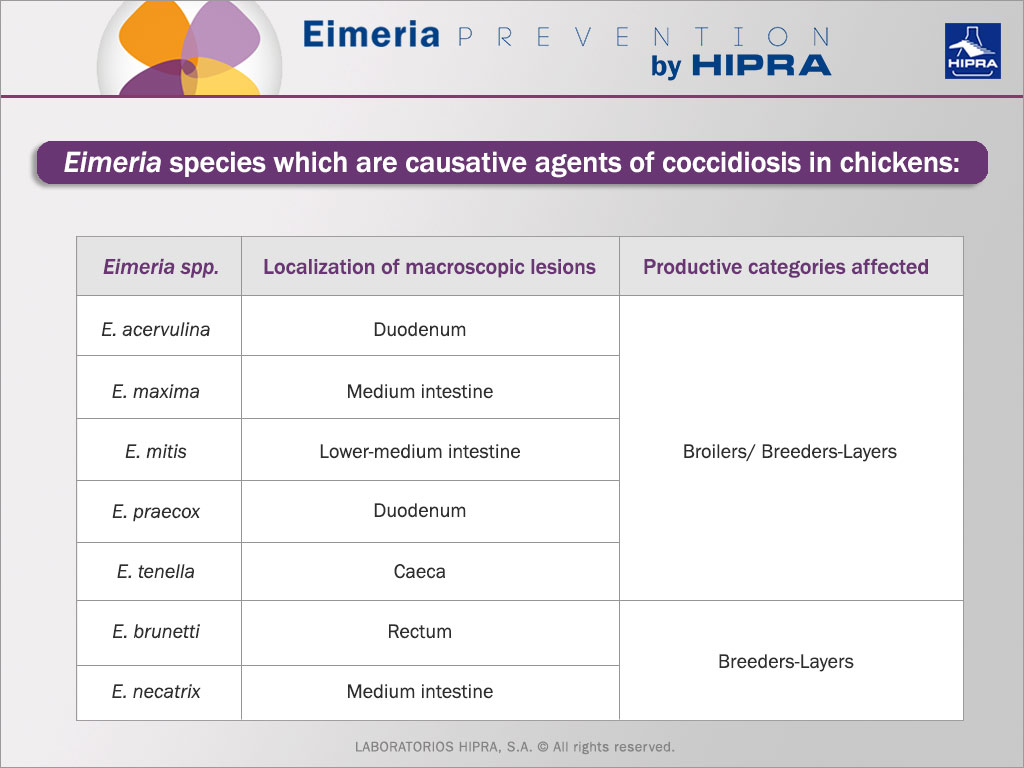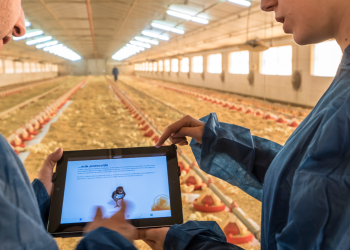The Eimeria biological cycle is a very complex one and is comprised of intracellular, extracellular, asexual and sexual stages. It is of paramount importance its understanding as its comprehension helps to understand the parasite epidemiology in the field, its pathogenicity and immunobiology.
Seven species of Eimeria (E. acervulina, E. brunetti, E. maxima, E. mitis, E. necatrix, E. praecox and E. tenella) are recognized to be causative agents of coccidiosis in chickens of the genus Gallus gallus.
The most commonly recognized species in the broiler chickens are Eimeria acervulina, E. tenella and E. maxima.
E. praecox and E. mitis, whereas in layers and breeders it is likely to find also E. necatrix and E. brunetti seen that these two species need a longer period to replicate and reach a number of oocysts able to cause clinical signs and macroscopic lesions:
Gut localization of macroscopic lesions and categories of birds affected by the 7 Eimeria spp. affecting Gallus gallus.
The lifecycles of all these species of Eimeria are homoxenous and hosts are infected by the oral-faecal route.
Chickens ingest sporulated oocysts, which contain four sporocysts, -each containing two sporozoites- from contaminated litter and then pass into the gizzard, where sporocysts excyst from the oocysts, thanks to the mechanic grinding of the gizzard together with the feed and its acid content.
Subsequently the sporocysts reach the intestine, where – due to enzymes, bile and CO2 – they release the sporozoites which invade the cells of the intestinal wall.
As we can see from the above table, each species of Eimeria has specific gut localization where it undergoes the schizogony causing different degrees of lesions depending on the seriousness of the infection. This is very important to keep in mind for diagnostic purposes.
Sporozoites of Eimeria brunetti and E. praecox penetrate the most superficial layers of enterocytes, whereas the sporozoites of other species (E. acervulina, E. maxima, E. necatrix and E. tenella) are able to reach the crypt epithelium, where they undergo development. Sporozoites penetrate into enterocytes’ core and start nuclear division followed by cytoplasmic differentiation.
This replicative phase, called schizogony or asexual replication, leads to cellular damage in the epithelium, in fact ends with the formation of a mother cell, called schizont, with first generation of merozoites inside. The schizont grows, breaks the enterocytes and releases the first generation merozoites that penetrate other host cells.
During the 2nd and 3rd phase of asexual replication gut damage becomes evident because of the high number of merozoites infecting enterocytes.
The schizogony is important to understand the pathogenicity of each Eimeria spp., the immunobiology of the parasite (intracellular) and the way of attenuation of vaccines attenuated for precociousness.
In fact, the strains contained in these vaccines undergo less schizogonies resulting in less gut damage with on the other hand the capacity to develop a full immunity.
After at least two generations of asexual reproduction, Eimeria merozoites enter the sexual replication or gamogony; in fact they invade the enterocytes and differentiate into either male (microgamonts) or female (macrogamonts).
The microgamonts release many microgametes that exit, seek and fertilize the macrogamonts. This fusion produces a zygote (immature oocyst) that is subsequently excreted in the faeces.
The gamogony is responsible of the passage of genetic information to the next generation of oocysts about resistance to anticoccidials.
Given the correct environmental conditions (warmth, oxygen and moisture), the oocyst sporulates and becomes infective undergoing sporogony (a meiotic process) that takes about 24 hours.
The entire Eimeria cycle usually takes 4-7 days depending on the species.
This short life-cycle combined with the potential for massive reproductive capability during the intracellular phase, makes this group of parasites a serious problem under intensive farming condition.
The video above explains the key points of Eimeria biological cycle and principles of immunology.




